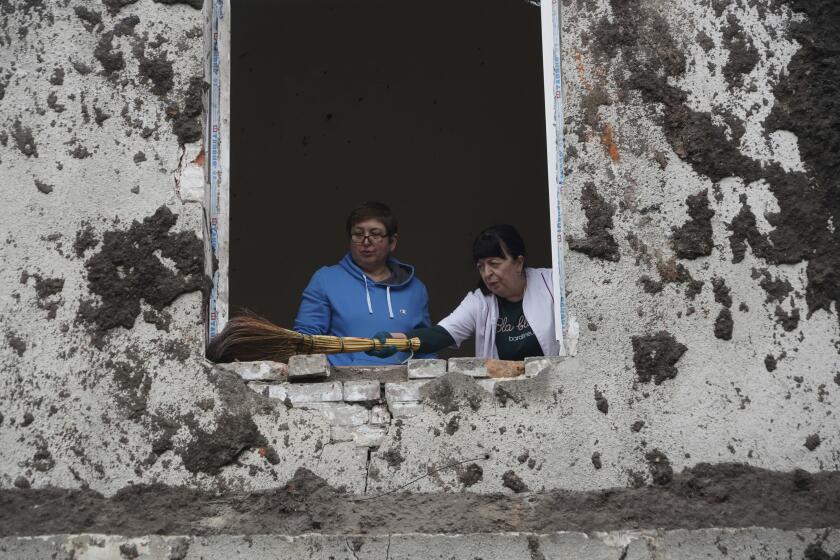Rebels Banking on U.S. Pullout, Official Says
Insurgents in Iraq will probably sustain the current rate of bloody attacks for at least six months, through the next elections, and expect the United States to give up on Iraq within five years, senior defense officials in Baghdad said Friday.
Increasingly violent suicide and roadside bombings are expected to continue at a rate of 65 daily -- nearly 500 a week -- as insurgents still hold enough popular support to carry them out, the officials said, outlining the U.S.-led coalition’s latest intelligence assessment of security here.
Hoping that support for the Iraqi government will wane, rebel forces are banking on a coalition withdrawal that will allow them to eventually take power, said the officials.
“We have to make certain assumptions for planning. Because the number of incidents and indicators have been relatively stable, we must assume that will hold true for the next several months, absent a diplomatic and a political breakthrough” with insurgents, Army Lt. Gen. John R. Vines, the commander of coalition forces in Iraq, said in an interview.
Vines and three other senior officials, who spoke on condition of anonymity because their comments reflected ongoing military and intelligence operations, outlined an updated picture of an insurgency increasingly driven by a small minority of foreign fighters carrying out bolder and deadlier bombings under the leadership of Jordanian Al Qaeda figure Abu Musab Zarqawi.
That picture belies some Bush administration estimates that the insurgency was, as Vice President Dick Cheney said, “in its last throes,” and hews closer to Defense Secretary Donald H. Rumsfeld’s statement that it could last as long as a dozen years.
A lengthier insurgency would leave the Iraqi army and other security forces to fight the guerrilla movement, as the United States proceeded with its goal of gradually withdrawing troops, one province at a time, the defense officials said. At least three of the nation’s 18 provinces could be turned over to Iraqi forces as early as this year, helping draw down U.S. troop numbers from the current 138,000, Vines said.
“It will require several factors to fall into place, including continued progress against the insurgency and continued development of Iraqi security forces and the Iraqi government,” he said. “If that progress continues, I am prepared to recommend U.S. troop numbers come down fairly soon after the election. My recommendation will be based on conditions at that time, but it could conceivably be as much as 20 to 25% following the elections.”
Although the insurgency could sustain itself in the short term, with an estimated 100 to 200 foreign fighters entering the country from Syria each month, the commanders said evidence suggested that the insurgents could be running low on funds. Izzat Ibrahim, a fugitive general loyal to Saddam Hussein, recently asked other sympathizers of the ousted dictator to give money to the insurgency, the officials said. Ibrahim is believed to have operated out of Syria, they said.
However, a senior Western diplomat familiar with the region said in late spring that the insurgency “had hundreds of millions of dollars” at its disposal, and would be able to continue operations for years to come. Hussein’s first wife, Sajida Khairallah Telfah, is considered a “major financier” of the opposition, funneling funds through Syria, the defense officials said.
As some insurgents from Zarqawi’s group and Hussein sympathizers use Syria as a haven, the defense officials said, they also have shown an interest in reasserting control over Fallouja, in western Iraq. The city is undergoing a massive reconstruction after U.S. troops drove out insurgents in street-to-street fighting in November. As with Mosul, in the north, officials said, Fallouja holds strong symbolic value for the insurgents, as a Sunni-dominated region with a ferociously independent streak.
“They got spanked,” one American general said. “This was a resounding defeat for them, and they want it back.”
One prospect for a faster end to the insurgency throughout Iraq, commanders speculated, is negotiations that would bring the mostly Sunni Arab insurgents into the government peacefully. Hussein, a Sunni, gave the minority Sunnis favored status and repressed the majority Shiites. Now Sunnis feel marginalized under the Shiite-dominated government.
“A fundamental of conflict resolution is negotiation,” Vines said. “To terminate hostilities, the two sides have to negotiate.” Short of a surprise diplomatic solution, however, American commanders expect anti-coalition Sunnis to pursue a two-track strategy: infiltrating the new government and security forces while continuing to back the insurgency.
Attacks on Shiites, apparently designed to foment a civil war between the two Muslim sects, are expected to continue, the officials said.
“It is not a new phenomenon, but it has taken an increasingly vile and revolting turn because Zarqawi has targeted the Shia mosques and population,” Vines said.
A number of Sunnis also have been killed.
Asked about the prospect of a civil war, he said: “While it is not a likely outcome, we believe that is Zarqawi’s desired end state. If a segment of the population believes that it is under attack, there is an impulse to strike back, and that is of grave concern to us.”
U.S. commanders blame Zarqawi in particular for a spate of increasingly large bombings, such as the attack that caused a fuel tanker to explode last week, killing nearly 100 people.
Only two or three of the hundreds of suicide bombings since the war began in March 2003 appear to have been committed by Iraqis, apparently radical Kurds from the north, according to the military intelligence assessment.
“There is no significant number of Iraqis who are willing to blow themselves up,” one official said.
The bombers who are found afterward are often difficult to identify, but Iraqis agree that they appear to be foreigners.
The foreigners detained by U.S. forces in Iraq have come largely from Egypt and, secondly, Saudi Arabia, with others from Libya, Sudan and Tunisia, U.S. military officials said. Some recently discovered roadside bombs bear the earmarks of Hezbollah, the Lebanese militant group.
The increased visibility of foreign fighters, whose numbers have sometimes been estimated as low as 5% of the insurgency, has helped cement a loose bond between the fledgling Iraqi government and security forces and their American counterparts, one senior defense official in Baghdad said.
“What we get from the Iraqi government is: ‘We want you to help us. Then we want you to leave,’ ” the official said.
“And we’re OK with that.”
More to Read
Start your day right
Sign up for Essential California for news, features and recommendations from the L.A. Times and beyond in your inbox six days a week.
You may occasionally receive promotional content from the Los Angeles Times.






